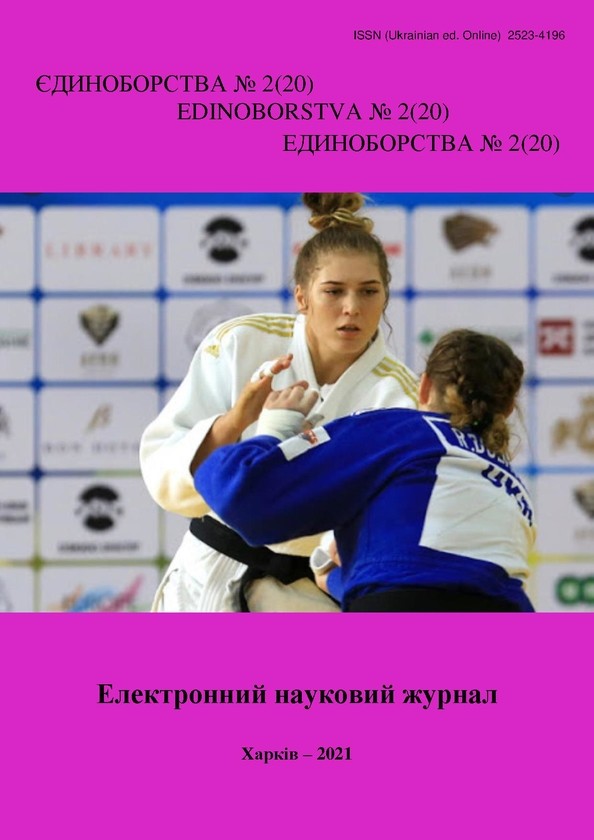Аналіз критеріїв оцінки суддів дзюдо за показниками роботи на змаганнях
DOI:
https://doi.org/10.15391/ed.2021-2.09Ключові слова:
дзюдо, анкетне опитування, ранжирування, критерії, судді, професійна етикаАнотація
Мета: за допомогою анкетного опитування провести аналіз критеріїв оцінки суддів дзюдо за показниками роботи на змаганнях. Матеріал і методи. Під час дослідження застосовувались наступні методи: теоретичний аналіз і узагальнення літературних джерел, дані мережі Інтернет, анкетне опитування, узагальнення теоретичного і практичного досвіду фахівців в області спортивних єдиноборств, методи математичної статистики. Було проведене анкетне опитування суддів з дзюдо. У дослідженні прийняли участь 30 суддів з дзюдо міжнародної категорії (3 чоловіки – 10 %) національної категорії (15 чоловік – 50 %) та першої категорії (12 чоловік – 40 %). Результати: аналіз проведеного анкетування суддів дзюдо на основі 50-ти критеріїв оцінювання за показниками роботи суддів на змаганнях виявив основні 11 критеріїв які є на думку більшості фахівців найбільш дієвими. Таким чином 11 критеріїв розподілилися між фахівцями міжнародної, національної та першої категорій суддів за результатами розрахунку коефіцієнту вагомості та пріоритетності наступним чином: на першому місці – професійна етика та дисципліна 1,33; на друге місце - зовнішній вигляд 1,66; на третє місце - знання правил та вміння їх використовувати 3,66; на четверте місце - займає чіткість команд та жестів 4,66; на п’яте місце - пересування по татамі та вибір вірної позиції 5,00; на шосте місце - взаємодія з суддями 6,67; на сьоме місце - вміння вірно та вчасно оцінювати помилки 7,66; на восьме місце - вміння вірно та вчасно оцінювати технічні дії 8,00; на дев’яте місце - психологічна стійкість 8,33; на десяте місце - реакція на ситуації 8,66; на одинадцяте місце - вміння користуватись технічними засобами 10,33. Висновки. Таким чином, проведене анкетування суддів різних категорій із 50-ти запропонованих критеріїв дозволило виявити 11 найбільш практичних критеріїв за якими можливо оцінювати роботу суддів на змаганнях. В результаті анкетного опитування більшість фахівців поставило на перше місце - професійну етику та дисципліну; друге місце - зовнішній вигляд; третє місце - знання правил та вміння їх використовувати.
Посилання
Ананченко, К. В., & Хацаюк, О. В. (2016). Новий методичний підхід для оцінки відеоматеріалу, що використовується при підготовці дзюдоїстів. Слобожанський науково-спортивний вісник, (4), 11-16.
Валеев, Р. Р. (2014). Использование современных технологий в судействе по дзюдо. Молодежь XXI века: потенциал, тенденции и перспективы, Т. 1, 77-79.
Венглинский Г. П. (1998). Отбор судей по спортивной борьбе к соревнованиям высокого ранга. (Дис. ... канд. пед. наук). Москва, Россия.
Евтифиев, А. С. (2016). Подготовка арбитров в спортивной борьбе. Слобожанський науковоспортивний вісник, (1), 26-29.
Іваній, І. В. & Сергієнко, В. М. (2016). Психологія фізичного виховання та спорту. Навчально-методичний посібник, Суми.
Мкртчян, А. В. (1986). Содержание и методы формирования судейских функций у студентов институтов физической культуры специализирующихся по спортивной борьбе. (Автореф. дис. ... канд. пед. наук), Москва, Россия.
Орлов, А. И. (2002). Экспертные оценки. Учебное пособие. Москва, 31.
Рудик, П. А. (1961). Воспитание волевых качеств и психологическая подготовка спортсмена в процессе тренировки. Доклад чл. кор. Акад. пед. наук РСФСР проф. П.А. Рудика. Москва.
Трофимов, А. И. (2002). Критерии оценки и методика подготовки судей по дзюдо. (Автореф. дис. ... канд. пед. наук), Москва, Россия.
Ушенин, А. И., Оруджев, А. М., & Арсеньев, В. А. (2017). Требования, предъявляемые к оценке (судейству) боевых приёмов борьбы. Современные тенденции развития науки и технологий, 105.
Федоров, В. И., & Коричко, Ю. В. (2017). Критерии и оценка личностных качеств спортивных судей в дзюдо. Направления в области физической культуры, спорта и туризма, 268.
Чоботько М. А., Чоботько, І. І, & Бойченко, Н. В. (2020). Дослідження проблеми підвищення професійного рівня суддів з дзюдо. Единоборства, (4), 82-89.
George, A. Miller. The Magical Number Seven, Plus or Minus Two.(1956). The Psychological Review, (63), 81-97











